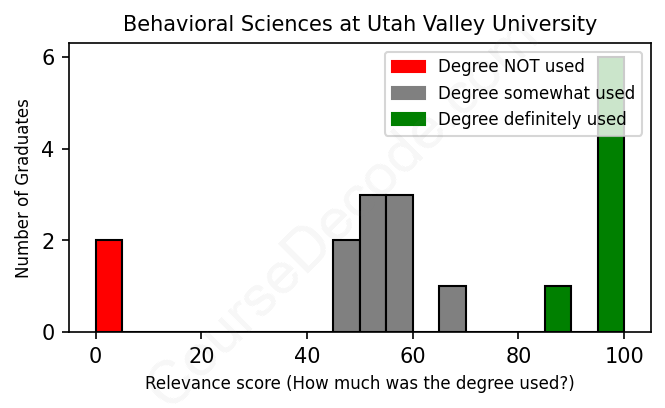
First, some facts. Of the Behavioral Sciences graduates from Utah Valley University we've analyzed , here's how many have used (or NOT used) their degree in their career:

These are estimates based on AI analysis of 18 LinkedIn profiles (see below).
The verdict? Slightly below average. Overall, with an average relevance score of 64%, Behavioral Sciences graduates from Utah Valley University have a slightly lower likelihood (-3%) of finding work in this field compared to the average graduate across all fields:
And for comparison, here's the chart for all profiles we've looked at across all degrees.
Also, after graduating, 50% of these graduates have pursued further education other than another Bachelor's degree (such as a Masters degree or other), compared to the average across all profiles of 35%. This suggests you may need more than just a Bachelors degree to be competitive as a Behavioral Sciences graduate.
See the details:
|
Relevance score: 50% We think this person has gone into a career only somewhat relevant to their degree. We think this person has gone into a career only somewhat relevant to their degree.
DEGREE INFOGraduated in 2018 from Utah Valley University with a Bachelor of Science - BS in Behavioral Sciences. No other secondary education since. JOB HISTORY SINCE GRADUATIONDirector Of Operations Direct Mail by Hand Jun 2020 - Dec 2021 ABOUTI am a wife and mother of 3 boys, and it has been the greatest experience! Raising kids has taught me to work hard, to lead, and to be patient and work well with others. I've helped run a small business for the last couple years, and it has given me a lot of cross-functional professional experience that has prepared me to take on my next challenge! |
The top 10 most common jobs done by the graduates we've analyzed (ranked most common to least) are:
Most people who graduated with a degree in Behavioral Sciences from Utah Valley University have landed jobs that more or less connect to the skills and knowledge they gained during their studies. The most common types of jobs seem to be in counseling and mental health services, like positions as clinical mental health counselors, therapists, and roles in supportive environments such as those in veterans' services. These jobs are directly tied to what you’d learn in behavioral sciences, having a clear connection to theories and practices on how to help people navigate their mental health challenges. There are also some roles in academic advising and education, where understanding student behaviors is important, and even a few positions in the healthcare field that deal with patient behavior and needs.
On the flip side, not every job held by graduates is closely aligned with their degree. A number of them have taken on roles in management, customer service, or even sales that don’t necessarily require in-depth knowledge of behavioral sciences. While some of these jobs may benefit from a basic understanding of human behavior (like sales or team management), they often don’t tap directly into the core principles and applications learned in school. So, while many grads are putting their degrees to good use in relevant fields, there’s also a significant portion who have found themselves in roles where their education isn’t as critical to their day-to-day tasks.
Here is a visual representation of the most common words in job titles for Behavioral Sciences graduates (this is across all Behavioral Sciences graduates we've analyzed, not just those who went to Utah Valley University):

Graduates from the Behavioral Sciences program at Utah Valley University typically follow diverse career paths that range from mental health counseling to administrative roles in educational settings. Right after graduating, many individuals often land entry-level positions that align closely with their studies, such as internships in counseling centers or roles as mental health counselors. For instance, several graduates transitioned smoothly from internships to full-time positions in mental health counseling, showcasing a strong initial focus on helping others and supporting mental wellness. Over the first few years post-graduation, many continue to build on these experiences and take on more responsibilities, often moving into managerial or specialized roles within healthcare and educational institutions.
However, not all graduates stay within the realm of behavioral sciences. Some have ventured into unrelated fields such as operations management or sales, which suggests a bit of a mixed bag when it comes to long-term trajectories. By five to ten years after graduation, many graduates have progressed into prominent positions within their initial sectors, such as directors in mental health organizations or leadership roles in educational administration. While numerous alumni find fulfilling careers that resonate with their degrees, a noticeable portion has branched out into areas that may seem disconnected from behavioral sciences. Overall, those who stick with the behavioral health path tend to do quite well, while others may explore varying careers, showcasing the versatility of a behavioral sciences degree.
Getting a Bachelor’s degree in Behavioral Sciences at Utah Valley University is generally considered to be on the easier side compared to some other majors, but like any degree, it has its challenges. The coursework usually covers a range of topics, like psychology, sociology, and human behavior, which can be really interesting and relatable, but you still have to put in the effort to keep up with readings and assignments. If you're good at understanding people and enjoy discussions about human behavior, you'll probably find it pretty engaging. Just remember, while the degree might not be super tough, it still requires dedication and time management to get through it successfully.
Most commonly, in the LinkedIn profiles we've looked at, it takes people 4 years to finish a Bachelor degree in Behavioral Sciences.
Looking at the job paths of these Behavioral Sciences grads from Utah Valley University, it seems like their earnings vary quite a bit. Some have landed solid positions in mental health and counseling, which can offer decent salaries, especially as they gain experience. For example, roles like Clinical Mental Health Counselor and Marriage and Family Therapist generally pay pretty well. On the other hand, some graduates have taken roles that might not be as lucrative, like working as receptionists or in entry-level positions. Overall, it looks like they have the potential to make decent money, especially as they move up in their careers, but it's not guaranteed right off the bat, and it really depends on the specific roles they end up in.
Here is a visual representation of the most common words seen in the "about" section of LinkedIn profiles who have a Bachelor degree in Behavioral Sciences (this is across all Behavioral Sciences graduates we've analyzed, not just those who went to Utah Valley University). This may or may not be useful:

Here are all colleges offering a Bachelor degree in Behavioral Sciences (ordered by the average relevance score of their Behavioral Sciences graduates, best to worst) where we have analyzed at least 10 of their graduates:
| College | Score | Count |
|---|---|---|
 Wilmington University Wilmington University
|
84 | 20 |
 Mercy College Mercy College
|
73 | 12 |
 Bellevue University Bellevue University
|
68 | 18 |
 Utah Valley University Utah Valley University
|
64 | 18 |